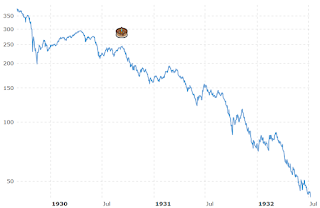<ウォーレン・バフェット> 1930年が株価下落中の年だとは、世間では考えられていませんでした。大恐慌のさなかだとも思われず、過去にも10回は到来したような景気後退にちがいないと考えられていました。しかし株式市場がつねに重要だとは言えないのですが、当時の米国では数々の景気後退があったことで、その事態が通例を逸脱した激烈なものだとはみなされませんでした。しばしの間、すなわちわたしの誕生後10日間ほどは、株価は辛くも1-2%近く上昇しました。しかし、それが最後の日となりました。
そして次のスライドです。わが誕生日から数えはじめると、株式市場の水準は240から41に下落しました。これは特筆すべき下落です。わたしが産まれたときに1,000ドルもらったとして、そのお金でダウ平均を買っていたら、2年も経たないうちに170ドルに減ってしまうわけですから。これは、だれも経験したことのない事態でした。個別株を買えばそうなることもありえますが(笑)、米国企業全般を保有しているという点で、2年以内に83%の値下がり、あるいは1929年9月3日の最高値から89%の値下がりというのは、甚大極まりないできごとでした。
(Warren Buffett 36:47)
People did not think in the fall of 1930, they did not think they were in a great depression, they thought it was a recession very much like had occurred at least a dozen times, although not always when stock markets were important, but we'd have many recessions in the United States over that time, and this did not look like it was something dramatically out of the ordinary. For a while, actually for about 10 days after my birth, that'd be [inaudible 00:37:28] and the stock market actually managed to go up all of 1-2% there in those 10 days, but that's the last day.
(Warren Buffett 37:42)
Well, from that point, if you'll turn to the next slide, the stock market went from level of 240 to 241, which was a noticeable decline, because if somebody had given me $1,000 on the day I was born, and I'd bought stocks with it, and bought the Dow Average, my $1,000 would have become $170 in less than two years, and that is something that none of us here have ever experienced that we may have had it with one stock occasionally, but in terms of having a broad range of America mark down 83% in two years, and mark down 89% of the peak, that was in September 3rd, 1929, was extraordinary.
2020年5月22日金曜日
2020年バークシャー株主総会(9)本物の下落がやってきたとき
バークシャー・ハサウェイの株主総会より、大暴落の話題のつづきです。前回分の投稿はこちらです。(日本語は拙訳)
2020年5月18日月曜日
2020年バークシャー株主総会(6)1929年の大暴落
バークシャー・ハサウェイの株主総会より、前回のつづきで、今回からは世界恐慌の話題です。前回分の投稿はこちらです。(日本語は拙訳)
<ウォーレン・バフェット> 今度は、別の種類の危機についてお話ししたいと思います。それはもちろん、1929年にこの国を襲った大暴落のことです。そこからさらに世界恐慌へとつながりました。ここではダウ・ジョーンズ工業株価平均を使って説明します。実際のところ、当時はだれもが注目する数字でした。2番目に重要とされていた株価平均は、新聞に載っていたように、ニューヨーク・タイムズ平均でした。ただし今では消滅しています。むろんS&Pはすぐれた指標ですが、ダウ平均も文句なしに適切な指標です。さて1929年9月3日には、ダウ平均の終値が381.17ドルを付けました。人々はとても幸福で、信用取引で株式を買うことが見事にうまくいっていました。
「狂騒の20年代」はそのような状況に満足していました。信じがたいかもしれませんが、自家用車が定着し、航空機による旅行の時代が到来し、あらゆる種類の家電やさらには電話も広まるようになりました。これらは、以前にはそれほど普及していなかったものです。映画も登場しました。幸福な時代だったのです。そして次のスライドに進みますと、ダウ平均は9月3日からの数か月間で、ほぼ半値まで下落しました。実に鮮烈なできごとでしたが、今回わたしたちが直面した状況も同様で、もっと短い期間のうちに株価の三分の一を失いました。1929年の大暴落のことを描いた、すばらしい本があります。ジョン・ケネス・ガルブレイスの著書『The Great Crash(邦題:大暴落1929)』です。 ここで少しばかり別の話を割り込ませてください。オマハで営業している小さな事業者についてです。
(Warren Buffett 31:46)
So let's move on to another crisis of a different sort, that hit the country, and this of course is the 1929 crash, which led to the Great Depression. Here the Dow Jones average, which we'll use through this. At that time, that's the one everybody paid attention to, actually. The second most important average at that time, if you look at the papers, was the New York Times average, which has disappeared, and of course the Standard and Poor's has probably, regardless is a superior yardstick. But the Dow Jones is a perfectly adequate yardstick. On September 3rd, 1929, the Dow Jones average closed at 381.17, and people were very happy and buying stocks on margin that worked wonderfully.
(Warren Buffett 32:55)
The roaring twenties had a good feeling to it with the auto coming of age and the day of air travel coming along and all kinds of new appliances and the telephone getting wider use, believe it or not. Hadn't really caught on that much prior thereto. But the movies were coming on. It was a happy place. Then, of course, if we go to the next slide, we'll look at what happened in the couple of months after September 3rd and the Dow Jones average almost got cut in half, and that was pretty impressive until we had this recent situation where in a shorter period of time we lost about a third. But the crash, and there's a great book about it called The Great Crash by John Kenneth Galbraith. Let me interject one little plug here. There's a small business in Omaha, and I hate what this-
登録:
コメント (Atom)




